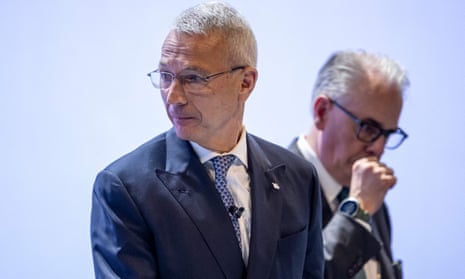Furious Credit Suisse investors at its final ever annual meeting blocked executive pay plans and called for board members to be “put behind bars”, as the Swiss lender’s chair said he was “truly sorry” over the bank’s demise.
Shareholders used most of the nearly five-hour annual general meeting in Zurich – the last in the 167-year-old bank’s history – to voice fury over poor management, hitting out at excessive pay for “incompetent and greedy” bankers who they said took too many risks and endangered Switzerland’s economic prosperity.
Board members were also criticised for being too quick to agree to its takeover by UBS last month and striking a bad deal for investors, although bosses said the only alternative was bankruptcy. “This is a dishonourable day for Switzerland,” one investor said. “I believe we have basically lost trust in the Swiss financial sector.”
Another lamented the collapse of its shares, which he said were now worth no more than a “sack of walnuts”, and offered some shells as a gift to the chair, Axel Lehmann. Another said it meant livelihoods of pensioners who relied on Credit Suisse stock had “gone up in smoke”, and warned that people “might even think of killing themselves because they no longer have any money left”.
He said the board needed to be held responsible for the many scandals that plagued the bank, including tax evasion and fraud. “These people should be taken to court, should be put behind bars, and should no longer be allowed to practise their profession,” the shareholder said.

Investors still narrowly approved the re-election of a slimmed-down board, as well as any pay they are due for helping UBS absorb its Swiss rival. That includes Lehmann, who gained approval for re-election from nearly 55.7% of shareholders.
However, executives were not so lucky. In a final rebellion, 48.4% of shareholders rejected a proposal to collectively pay executives up to 34m Swiss francs – £30m – over the next year, including for any work involving the merger. Only 48.2% approved the plan.
It was not immediately clear whether that would mean remaining executives having to work for free. “The board will assess this result and will determine potential further measures,” Credit Suisse said in a statement.
The investor anger came despite apologies from Lehmann, who insisted bosses had had legitimate plans to turn the bank around but had been “thwarted” by market panic over the wider health of the global banking sector, after the collapse of the US tech lender Silicon Valley Bank days earlier.
He said the bank had “fought hard to find a solution” but had ultimately been left with two options: either strike a deal with UBS or declare bankruptcy.
“We wanted to put all our energy and our efforts into turning the situation around,” Lehmann said. “It pains me that we didn’t have the time to do so in that fateful week in March our plans were thwarted. And for that I am truly sorry.”
He added: “I apologise that we were no longer able to stem the loss of trust that had accumulated over the years and for disappointing you.”
after newsletter promotion
Credit Suisse was sold to UBS through a Swiss government-orchestrated emergency takeover on 19 March as panic over the health of the financial system swelled after the collapse of SVB that month.
The Swiss lender had long been struggling to keep customers and turn profits after a prolonged series of scandals, compliance problems and bad financial bets. However, confidence was almost wiped out in mid-March after its largest shareholder, the Saudi National Bank, ruled out providing further funding because of regulations that in effect capped its investment.
The Swiss authorities stepped in, originally offering a 50bn Swiss franc (£45bn) line of credit, and eventually ushering in a takeover by Credit Suisse’s larger domestic rival UBS four days later.
Credit Suisse’s chief executive, Ulrich Körner, told shareholders he understood their disappointment. “After 167 years, Credit Suisse is giving up its independence.”
However, Lehmann said the only other option would have been bankruptcy. “This would have led to the worst scenario: namely a total loss for shareholders, unpredictable risks for clients, severe consequences for the economy and the global financial markets,” he said.








